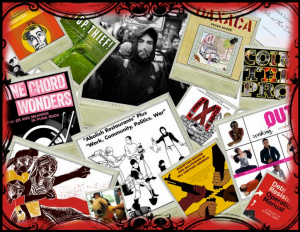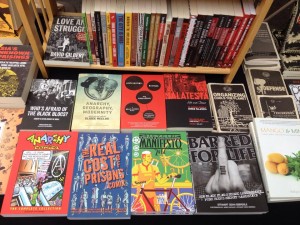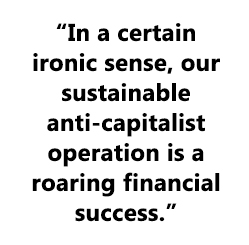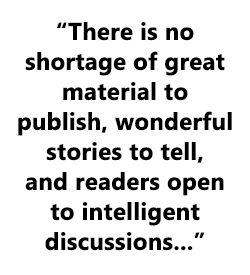
Sign up today...
for featured titles, special offers, bestsellers, and more, in your inbox!
 PM Press is an independent publisher that specializes in radical, Marxist and anarchist literature, as well as crime fiction, graphic novels, music CDs, and political documentaries. In other words, PM Press is the coolest.
PM Press is an independent publisher that specializes in radical, Marxist and anarchist literature, as well as crime fiction, graphic novels, music CDs, and political documentaries. In other words, PM Press is the coolest.
Here, co-Founder Craig O’Hara walks us through how a history of anarchism and activism has led PM Press to the success they see today, and how they march ever toward a “most just, humane, and fun world.”
IPG: How did PM Press get its start? How did you specifically find your way into publishing?
Craig O’Hara: Nearly everyone at PM Press was already involved in some aspect of independent or grassroots publishing and distribution before PM got its start in 2007. In our organization we have folks with decades of experience in book publishing and distribution operations (pre-dating the internet, ouch), running independent bookstores, slinging merch with rock bands, designing print-ready materials for hip magazines and corporate clients, and plenty of experience warehousing and shipping books. No one at PM was really a “rookie” before we started, and we’ve been lucky to assemble something of a dream team of experienced folks without ever advertising for outside help.
What brings us togeth er at PM is the desire to both publish and actively promote materials that we feel can make a difference in our present/everyday society. Influenced greatly by actions and ideas from the history of anarchism and social justice activism, we want to publish and promote books and materials with ideas geared towards creating a most just, humane, and fun world.
er at PM is the desire to both publish and actively promote materials that we feel can make a difference in our present/everyday society. Influenced greatly by actions and ideas from the history of anarchism and social justice activism, we want to publish and promote books and materials with ideas geared towards creating a most just, humane, and fun world.
IPG: What differentiates PM Press from other publishers?
Craig O’Hara: To the public, it’s probably the wide range of events that we do to reach new readers. In 2015 we organized and promoted nearly 400 author events and 120 tabling/exhibiting events across North America, with a growing number in the UK as well. We take our boxes of books, folding tables, and bookshelves where no publisher has gone before. We table political and academic conferences, labor events, book fairs, craft fairs, really anywhere that books can be sold to a receptive audience. Who else has books available in every expected channel but are also top sellers in both Matewan, WV and Oaxaca, Mexico?
 In addition to nearly four hundred books we’ve published over nine years, we have also released dozens of CDs (both music and spoken word) and documentary DVDs covering everything from animal rights to Zapatistas.
In addition to nearly four hundred books we’ve published over nine years, we have also released dozens of CDs (both music and spoken word) and documentary DVDs covering everything from animal rights to Zapatistas.
We have no formal offices, yet are international. PM Press staff are located on both coasts of the US as well as Canada and the UK, working mostly out of their homes. We do have a variety of storage facilities, from working warehouses with forklifts to basements where the books fight for space with vintage motorcycle parts.
Within the industry, we differ from many other publishers in that we treat our authors with great respect. We pay regular royalties, actively sell foreign rights in multiple languages/territories, and generally give our authors more say in their project. We operate largely without subsidy (from wealthy individuals or corporations) and without debt, paying the printer on time and the full balance of any credit card use each month. In a certain ironic sense, our sustainable anti-capitalist operation is a roaring financial success.
IPG: How does you r mission of “creating radical and stimulating fiction and nonfiction books…” change how you navigate the publishing industry?
r mission of “creating radical and stimulating fiction and nonfiction books…” change how you navigate the publishing industry?
Craig O’Hara: It means we have to navigate and operate both inside and outside of the established industry. Since our beginnings, a full 50% of our income has been from direct/nonbooktrade selling. We are never chasing publishing trends, but seeking to publish underrepresented viewpoints that have the potential to affect and influence readers. Luckily we have assistance from the fine folks at IPG to help bridge the gap between what we do on a daily basis and the workings of the mainstream publishing industry.
IPG: What do our readers need to know about your books?
 Craig O’Hara: One neat fact is that they are nearly all printed in the US by the employee-owners at Thomson Shore in Dexter, MI. Beyond that, we want readers (and writers) to know that “you can do this too.” There are far too many fantastic books we receive as submissions that we simply don’t have the resources to publish. There is no shortage of great material to publish, wonderful stories to tell, and readers open to intelligent discussions outside of the mainstream media.
Craig O’Hara: One neat fact is that they are nearly all printed in the US by the employee-owners at Thomson Shore in Dexter, MI. Beyond that, we want readers (and writers) to know that “you can do this too.” There are far too many fantastic books we receive as submissions that we simply don’t have the resources to publish. There is no shortage of great material to publish, wonderful stories to tell, and readers open to intelligent discussions outside of the mainstream media.
IPG: Who do you feel is your primary audience?
Craig O’Hara: We publish a broad enough range of books that it’s difficult to pinpoint or attempt to stereotype our primary audience. People interested in a better world? Well, who isn’t? Everyone from the multiracial working class whose lives are reflected and respected in our work to grad students and professors swimming in theory, to ethical vegetarians, cutting-edge artists, and punk rockers!
IPG: In your opinion, how has the publishing industry changed over the years?
 Craig O’Hara: Over the last few decades, much of the industry has been squeezed, shrunk, or discarded. There are fewer independent publishers and distributors (and all operating with a lower profit margin due in part to Amazon’s unfortunate presence), and the impressive flux of new bookstores (particularly those in high-rent, gentrified areas) can rarely afford to stock releases outside of the mainstream/sure-thing bestsellers. A television/internet-based, celebrity-driven culture has created a sad trend in the book business to chase after “the next big thing” as it runs by rather than operate as a forum for diverse and important ideas that impact our lives.
Craig O’Hara: Over the last few decades, much of the industry has been squeezed, shrunk, or discarded. There are fewer independent publishers and distributors (and all operating with a lower profit margin due in part to Amazon’s unfortunate presence), and the impressive flux of new bookstores (particularly those in high-rent, gentrified areas) can rarely afford to stock releases outside of the mainstream/sure-thing bestsellers. A television/internet-based, celebrity-driven culture has created a sad trend in the book business to chase after “the next big thing” as it runs by rather than operate as a forum for diverse and important ideas that impact our lives.
IPG: What do you think are the benefits of independent publishing? The drawbacks?
Craig O’Hara: The benefits are being part of the process of connecting the stories, ideas, and artwork of authors to a global community of readers. Drawbacks, well, very long hours and there’s not much money in it. We have very few authors who can make a living writing professionally, and virtually none that could do so solely from their PM releases. There just isn’t much money in book sales after each part of the food chain takes a bite.
IPG: Where do you see PM Press in five years?
Craig O’Hara: I expect it will be very similar to what we see now, some of us will be grayer and heavier, others will be younger and smarter. We just signed a five-year distribution deal with IPG, so I expect both organizations will continue to get better at what we do each year.
Leave a Reply